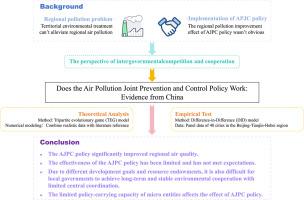大气污染联防联控政策是否有效?来自中国的证据
IF 7.9
2区 经济学
Q1 ECONOMICS
引用次数: 0
摘要
发展中国家在管理区域空气污染方面面临巨大挑战。虽然以往的研究显示了大气污染联防联控(AJPC)政策的益处,但还需要对其实施过程中的挑战有更多了解。利用中国京津冀(BTH)地区的数据,运用三方演化博弈(TEG)模型和差分法(DID),我们的研究探讨了大气污染联防联控政策的有效性。我们发现,AJPC 政策对空气质量产生了积极影响。但是,该政策在不同地区和不同时期的效果各不相同,因此很难实现最初的目标。此外,我们还发现了实施该政策所面临的挑战,如治理溢出带来的搭便车现象、中央政府监管的不稳定性以及微观实体的政策执行能力有限。我们的研究结果凸显了区域污染控制的复杂性,为完善发展中国家的污染管理策略提供了重要启示,为旨在加强区域空气质量控制的政策制定者提供了宝贵的指导。本文章由计算机程序翻译,如有差异,请以英文原文为准。

Does the Air Pollution Joint Prevention and Control Policy Work: Evidence from China
Developing countries face significant challenges in managing regional air pollution. While previous studies show the benefits of the Air Pollution Joint Prevention and Control (AJPC) policy, there needs to be more understanding of its implementation challenges. Using data from the Beijing-Tianjin-Hebei (BTH) region in China and applying a tripartite evolutionary game (TEG) model along with a difference-in-differences (DID) method, our study talks about the effectiveness of AJPC policy. We find that the AJPC policy has positively impacted air quality. However, its effectiveness varies across regions and periods, making it difficult to achieve the original goals. Additionally, we identified challenges to implementing the policy, such as free-riding from governance spillover, the instability of central government regulation, and the limited policy-carrying capacity of micro-entities. Our findings highlight the complexity of regional pollution control and provide critical insights for refining pollution management strategies in developing countries, offering valuable guidance for policymakers aiming to enhance regional air quality control.
求助全文
通过发布文献求助,成功后即可免费获取论文全文。
去求助
来源期刊

Economic Analysis and Policy
ECONOMICS-
CiteScore
9.80
自引率
9.20%
发文量
231
审稿时长
93 days
期刊介绍:
Economic Analysis and Policy (established 1970) publishes articles from all branches of economics with a particular focus on research, theoretical and applied, which has strong policy relevance. The journal also publishes survey articles and empirical replications on key policy issues. Authors are expected to highlight the main insights in a non-technical introduction and in the conclusion.
 求助内容:
求助内容: 应助结果提醒方式:
应助结果提醒方式:


